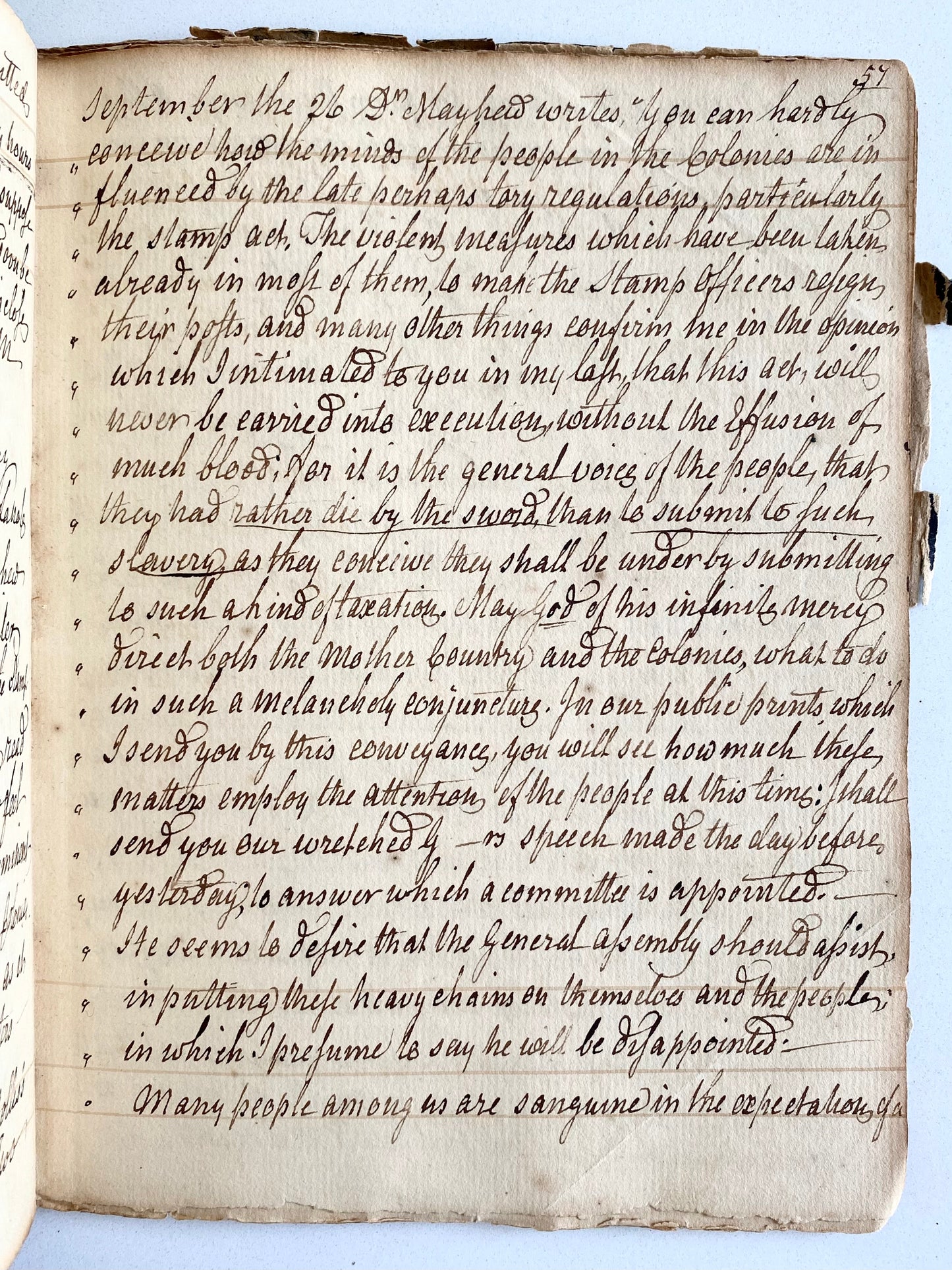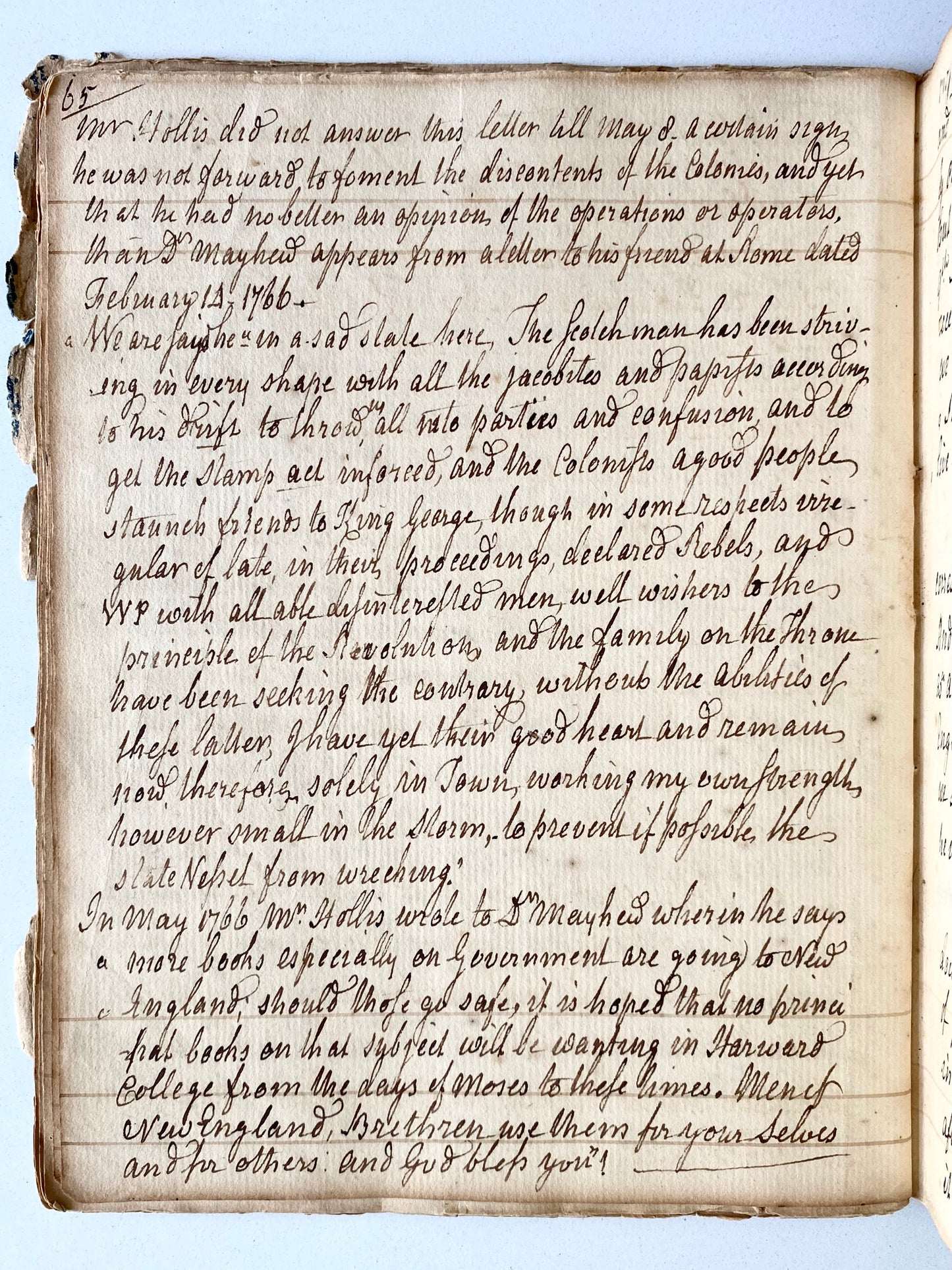Specs Fine Books
1776 JONATHAN MAYHEW. Rare Family MSs on American Revolution, &c. "No Taxation without Representation."
1776 JONATHAN MAYHEW. Rare Family MSs on American Revolution, &c. "No Taxation without Representation."
Couldn't load pickup availability
A delightful and expansive piece of manuscript Americana with direct connection to the American Revolution, Jonathan Mayhew and his family, etc.
The 95pp entirely handwritten manuscript involves three important American figures:
I. Jonathan Mayhew [1720-1766]. Born into one of the earliest and most influential families on Martha's Vineyard, Jonathan's father, Experience Mayhew, was a person of great personal piety and served as a missionary to the Native Americans of the island.
Today, Jonathan Mayhew is remembered as perhaps the generative preacher of the American Revolution. His 1750 sermon invokes for the first time what would become the war cry of American Liberty, "No Taxation without Representation." Many historians see this sermon as the first volley in an ongoing exchange that culminated in the issuance of the Declaration of the Independence and the Revolutionary War.
The sermon caught fire. It was printed in 1750, then in London in 1752, and again in 1767. John Adams said the sermon was "read by everybody." It practically created the language and consolidated American sentiment in the way necessary to gather the support and enduring the difficulties of military revolt against Britain.
In 1765, with the passage of the Stamp Act, he gave a repeat performance on similar themes, preaching on the divine right of liberty and the iniquity of tyranny. The dye was cast. He died in 1766, leaving behind a young widow and having played his critical role in preparing the way for America's future.
II. Thomas Hollis [1720-1774]. An influential English philosopher, Hollis had decidedly populist views that sent his sympathies in harmony with the plight of the American Colonies.
His views are evident from his efforts at distributing works advancing the cause of liberty. From 1754 forward he set about reprinting and distributing populist-leaning literature of previous ages, including Toland's Life of Milton, tracts by Marchamont Nedham and Philip Sidney, and John Locke's Two Treatises on Government. To him, these were not historical curiosities, but a message to the present governmental moment. He had his books elegantly bound for distribution and to give them greater effect they were embellished with libertarian ornaments such as the liberty cap and owl. His publications together were known as the "liberty library. He even published writings by American colonists on the Stamp Act crisis, including John Adams' Dissertation on the Canon and the Feudal Law (1765).
He was also a great supporter of Harvard, especially the library, which he often gifted with books, each bound and similarly decorated with libertarian symbols.
All this time, his most significant form of communication with America was found in his ongoing friendship and correspondence with Jonathan Mayhew. Their correspondence forms a critical body of illuminating work on the situation just leading up to the War for Independence and remains the subject of scholarly research [See Knollenberg; Robbins; Hooker; etc.]
III. Harrison Gray [1712-1794]. Gray, in whose hand the present manuscript is written in its entirety, was a long-time parishioner, close friend, and supporter of Mayhew's. It is said that at Mayhew's death, no person was more affected than Gray. Ironically, he was also the Province Treasurer, meaning he was responsible for collecting for the Crown [including of the Stamp Act].
Gray had been a founding member of the West Church where Mayhew Pastored. Just 8 years Mayhew's senior, Gray found in Mayhew a thoughtful pastor, a mentor in all things religious and political, a confidant, and friend. Gray was in reality essentially an honorary member of the Mayhew family.
When Jonathan died in 1766, it was perhaps not unnatural, especially for the time, that Gray would propose to Elizabeth. He himself was a widower. He was rebuffed and rather than live with the discomfort, returned to England. He was on record as a Whig and pro-American Liberty. It seems that he however never quite got his mind wrapped around an armed Revolution. He remained pro-American, but also anti-revolution the remainder of his life.
As a testament to the strength of the relationships between Gray and the whole Mayhew family, he remained a regular correspondent with Elizabeth [Jonathan's widow] and Elizabeth [Jonathan's daughter] for many years. The letters are warm, affectionate, and show an enduring care for the family.
Harvard holds two letters from Harrison Gray to Mayhew's daughter, Elizabeth [daughter], dated to 1783 and 1790.
In 1783, Gray seems to have begun an extensive correspondence with the daughter. With one letter, he even had transported to her an original painting of Jonathan he had held as a dear prize for many years.
With one of those letters, our present manuscript would have been included. The flyleaf reads:
"Mr Gray presents his most respectful compliments to Miss Eizabeth Mayhew, the only child of his never to be forgotten friend, the learned and pious Doct. Mayhew. And takes the liberty to send her the following extracts from the Life of the Late Mr. Hollis, the perusal of which must afford her great pleasure. August 26, 1789."
The 93 pages of manuscript extracts and handwritten index are entirely in the hand of Gray, all orbit around Jonathan Mayhew, his correspondence with Hollis, his personal character, history, views, and engagement with the Stamp Act, etc. A fascinating, crystallized snapshot of how Mayhew was viewed in the immediate wake of the Revolution by those who knew and cared for him.
Subjects covered include Mayhew's sermon on Unlimited Submission; the gift of Hollis' edition of Milton's works to Governor Hutchinson by Mayhew; Mayhew's political views [comparing British tyranny to the tyranny of Charles I . . . which obviously puts military action on the table]; Hollis' letter to Mayhew inculcating loyalty to the King; Mayhew's letter concerning American Bishops; Mayhew's letter to Hollis regarding the burning of Harvard's library; a report of the New Jersey library being burned by the King's troops; Mayhew's letter of 1765 concerning the riots at Boston; Mayhew's views of John Adams on Canon Law; Dr. Mayhew and the Stamp Act; etc. etc.
Complete, as created, housed in tatty 19th century wraps. Textually solid, crisp, and clean in Harrison Gray's entirely legible hand.
There does appear to be some very minor editing and a splash of what appears to be Gray's commentary here and there with the vast majority being directly from Blackburne, 1780.
Of great interest as well are the few early marginal notes, perhaps those of Elizabeth or an early relative. "This smacks of independence" is inked next to Mayhew's famous phrase, "But you and I Sir are clear in this point, that no people are under a religous obligation to be slaves if they are able to set themselves at liberty." Another note in an early hand regarding regarding Mayhew's comment that "the people in the Colonies are far, very far in deed from desiring to be independent" reads, "Samuel Adams, Otis said same 1765-1773." There are also other marginal notes clarifying dates, identifying anonymous persons, etc.
Share












